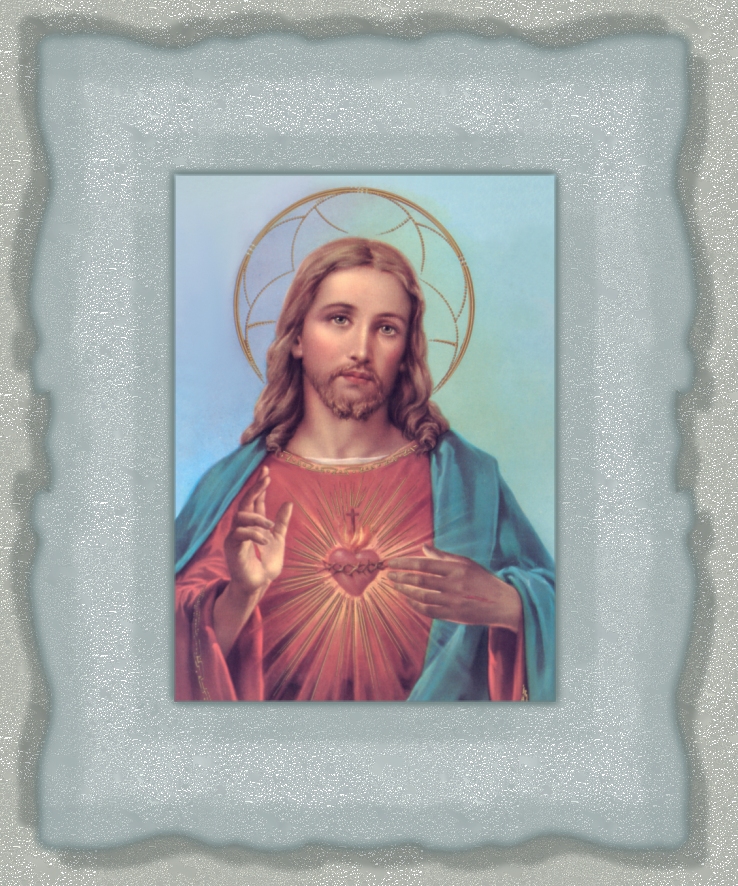FOUNDER AND APOSTLE OF THE
ENTHRONEMENT
Father Mateo Crawley-Boevey, SS.CC., Founder of the
Work of the Enthronement
of the Sacred Heart in the home, was born in Peru, South America, on
September
18, 1875. At the age of sixteen he joined the Congregation of the
Sacred
Hearts of Jesus and Mary in Valparaiso, Chile, and applied himself with
great zeal to promoting devotion to the Sacred Heart. Animated with the
desire to make more effective the promises of the Sacred Heart to St.
Margaret
Mary, he conceived the idea of drawing families closer to Jesus, the
King
of Love, by placing the image of His Sacred Heart in a place of honor
in
the home and thus bringing the family's life into intimate relations
with
Him.
In 1907, a breakdown in health sent him on a trip
to Europe. After visiting
the Motherhouse of his Congregation in Belgium, he went to
Paray-le-Monial
in France, overjoyed at being able to realize his desire to visit the
scene
of the apparitions of the Sacred Heart to St. Margaret Mary. He then
went
to Rome, where he submitted to a prominent Cardinal an outline of his
proposed
apostolate for the social reign of the Sacred Heart, together with a
rough
outline of the ceremonial of the Enthronement. Being greatly encouraged
by this prince of the Church, Father Mateo next sought and obtained a
private
audience with Pope Pius X, who in turn gave his whole-hearted approval
and "commanded" the young priest to devote his life to this magnificent
work.
Receiving this "command" as a mandate from Heaven,
Father Mateo at once
prepared to carry out his commission, with the approval and blessing of
his Superior General. First he returned to Paray-le-Monial to give
thanks
for this singular grace and to implore light and guidance as well as
the
necessary health for his mission. As he knelt in prayer at this
hallowed
spot, a strange sensation suddenly gripped his whole being, and he rose
to his feet, perfectly cured. At the same time a clear methodic plan of
the work took shape in his mind. It was August 24, 1907. That same
evening,
he drew up his plan "to conquer the whole world for the Heart of Jesus,
home after home, family after family."
After making a pilgrimage to the Holy Land, Father
Mateo returned to
Valparaiso, where he resumed his post of teaching in the school
conducted
by his religious community. At the same time he inaugurated his crusade
for the Enthronement of the Sacred Heart in the home. The work was
attended
with remarkable blessings ---- clearly
indicating that it was truly the work of the Sacred Heart. Fallen-aways
returned to the Sacraments, notorious sinners [including enemies of the
Church] were converted, the spiritual life of the whole parish was
renewed.
With the help of many "secretaries"
---- principally children, at first
---- letters were sent to
various countries and brought an
enthusiastic response. Father Mateo himself embarked on a crusade,
literally
traversing the world to "preach love," as he expressed it. South
America,
Spain, France, Portugal, Italy, Switzerland, Luxembourg, Belgium,
Holland,
England, Scotland, China, Japan, Indo-China, India, Ceylon, the
Philippines
and Hawaii, and finally the United States and Canada, came under the
sway
of his fiery eloquence, and responded magnanimously to his appeal "for
love for the Beggar of Love." Some of these countries he visited twice
and even three times, in response to pressing invitations from the
hierarchy
and clergy.
In his world-wide crusade, Father Mateo's heart and
soul, mind and body,
combined in a heroic effort to do the maximum amount of good to the
greatest
possible number of souls. He preached retreat after retreat, usually
giving
four sermons a day of one hour each. In his younger years he frequently
preached as often as eight times a day. In later years he at times
showed
signs of great fatigue, but when he rose to speak, his burning love for
the Sacred Heart sent a magic current of life into his exhausted body
and
he spoke with astounding energy and volume of voice.
Along with the Enthronement, Father Mateo promoted
Night Adoration in
the home as a means of intensifying the devotion of families to the
Sacred
Heart and of offering reparation to Him, especially for sins committed
in and by families. He also found time to write books of devotion and
various
treatises on the Enthronement, as well as periodical circular letters
aimed
at stimulating the fervor of his fellow-workers in the apostolate.
In the course of time, the work of the Enthronement
was efficiently
organized by the establishment of Enthronement Centers in each country,
where priests, religious and zealous lay persons work enthusiastically
in promoting both the Enthronement and the Night Adoration. In 1917,
the
Benedictine Convent of Perpetual Adoration at Clyde, Missouri, became
the
first authorized Center in the United States, outside the one operated
by the Sisters of the Sacred Hearts at Fairhaven, Massachusetts.
Each of the five Popes who reigned during the life
of Father Mateo
gave his full approbation and blessing to the Work: St. Pius X,
Benedict
XV, Pius XI, Pius XII, and John XXIII.
Styling himself the "beggar of love for the King of
Love," Father Mateo
spent himself unstintingly for the reign of the Sacred Heart over
hearts
and homes and nations. But he did not seek to attain this end by
preaching
alone. Rather, his preaching was ever the fruit of prayer, sacrifice
and
suffering, upon which he depended for the fruitfulness of his
apostolate.
He also used to very good effect the literary talent with which God had
endowed him. But the paramount reality in his life, the sun and center
of all his days and the source from which he drew light and strength
and
inspiration, was the holy Sacrifice of the Mass. To see him celebrate
the
Sacred Mysteries was in itself a seen more eloquent than any he could
preach.
He also insisted upon a living, loving devotion to the Holy Spirit, the
source of all interior light and supernatural inspiration.
Worn out by his incessant labors and by the ravages
of various ailments,
as well as by the weakness of advancing age, Father Mateo was forced,
at
length, to give up his preaching apostolate. In the fall of 1946 he was
confined to a hospital in Canada, and the remaining years of his life
were
spent for the most part in his "cloister of the Divine Will," his own
term
for a hospital. Nevertheless, he continued his crusade of love by
writing,
praying, and suffering. He still made his Holy Hour each night, and
daily
offered Holy Mass seated at an improvised altar in one of his hospital
rooms, using a privilege granted him by Pope Pius XI some years before.
In time, even this became impossible because of his physical condition,
and it was one of the greatest privations of his life not to be able to
offer the Mass.
In 1956, to the surprise of all who knew him, he
rallied sufficiently
to return by plane to the monastery of the Sacred Hearts in Valparaiso,
Chile, from which he had set forth some forty years before. For a time
he seemed marvelously renewed in strength and health, but old age and
chronic
illness continued their ravages, and he died on May 4, 1960, after
months
of intense suffering ---- a
veritable crucifixion.
Regarding his well-beloved apostolate, Father Mateo
once wrote to a
friend: "If you should hear that I have become paralyzed, that I am no
longer able to preach, to write, to walk, do not say, 'What of his
mission?"
No, for as long as I have a heart to love and a body to suffer, I will
still be an apostle. I would not then be preaching four or five times a
day, but a hundred times, on the cross. In life and in death I will be
an apostle, for I love Him, I love Him, I LOVE Him! In sickness and in
health, I will be an apostle, for I want all to love Him, to love Him,
to LOVE Him!"
Pontifical Letter of Approbation
To Our Beloved Son,
MATEO CRAWLEY-BOEVEY,
Priest of the Congregation of the Sacred Hearts of Jesus and Mary
Beloved Son, Health and Apostolic Benediction!
We have read your letter with interest; also the
documents that accompanied
it. They give proof of the zealous and untiring labors with which you
have
devoted yourself, for many years, to the work of consecrating families
to the Sacred Heart of Jesus in this particular manner: by placing an
image
or painting of the Sacred Heart in the most prominent place in the
home,
as on a throne, as a sign that Our Lord reigns visibly in these
families.
Already Our Predecessor, Leo XIII, of blessed
memory, consecrated the
whole human race to the Divine Heart of Jesus, and his encyclical Annum
Sacrum upon this subject is well known. Nevertheless, it seems
that even after this general consecration, the devotion extending to
individual
families is not without benefit; on the contrary it is in perfect
accordance
with the former, and can only contribute greatly to the realization of
the pious intentions of that Pontiff of blessed memory.
What concerns every single individual affects Us
more deeply, indeed,
than what is of general interest. Therefore, We rejoice that your
efforts
in this regard have brought such abundant fruit. We exhort you to
continue
zealously in the apostolate you have so successfully begun. At present
nothing Is more timely.
The malicious efforts of the wicked are specially
directed against
the home, the family circle. Since the family contains the root, the
elements
of civil society, the enemies realize well that the hoped-for
transformation
or rather the hoped-for destruction of all human society cannot take
place
before the ruin of the family is accomplished. Every effort is being
made
to weaken the firmness and indissolubility of the marriage bond and to
prevent our youth from coming under religious influence. Wickedness
goes
so far as to endanger the very propagation of the human race, and to
defile
the sanctity of matrimonial life by praising shameful practices for the
gratification of lust which frustrate the rights of the laws of nature.
You do well, therefore, beloved son, to take in
hand the welfare of
society to awaken and spread above all things a Christian spirit in the
home that the love of Jesus Christ may permeate the families, and His
love
reign there like a queen. By so doing you obey Jesus Christ Himself Who
promised to pour out His blessings on those homes where a picture of
His
Sacred Heart is exposed and venerated.
It is a holy and salutary work to show our most
loving Savior this honor
and homage; yet, all is not accomplished thereby. Of equal importance
it
is to know Christ, to take to heart His doctrine. His life, His
Passion,
His glorification. To follow Him does not consist in being guided by
passing
religious sentiments which easily touch tender hearts and move to tears
but leave vices unchecked. To follow Christ means to grasp Him with a
lively
and constant faith which at the same time influences heart and mind,
and
regulates our morals. Indeed, the very reason why Jesus is forgotten by
so many, and so little loved by others, is that to some He is almost
unknown
and by others not known sufficiently.
Continue, then, beloved son, your labors and your
apostolate, in order
to enkindle the flames of love for the Sacred Heart of Jesus in
Catholic
families. Above all, let your efforts and labors tend to this ---- it
is Our will ---- that to
every home where you apply, this love may come
as a result of the knowledge of Jesus Christ, and of the truths and
laws
which He has given us.
In 1913, Our Predecessor, Pius X, of blessed
memory, granted special
privileges at the request of the bishops of Chile to the families of
that
country who had consecrated themselves to the Sacred Heart of Jesus. To
encourage this universal pious work, We desire all these privileges to
be extended to the families of the whole Catholic world who perform
this
consecration.
As a pledge of Divine favors, and as a mark of Our
paternal good will,
We impart to you affectionately, beloved son, the Apostolic Blessing.
Given at St. Peter's, Rome, April 27, 1915
---- Benedict
XV, Pope.
|

 E-Mail
E-Mail

 E-Mail
E-Mail